Effects of Brexit on UK Economy and Standard of Living
VerifiedAdded on 2022/12/27
|12
|4196
|3
AI Summary
This essay evaluates the effects of Brexit on the UK economy and standard of living, including predictions and opinions during the Brexit process. It discusses macroeconomic policy analysis, variables used in the analysis, background of the UK economy before Brexit, and major opinions and predictions around Brexit.
Contribute Materials
Your contribution can guide someone’s learning journey. Share your
documents today.
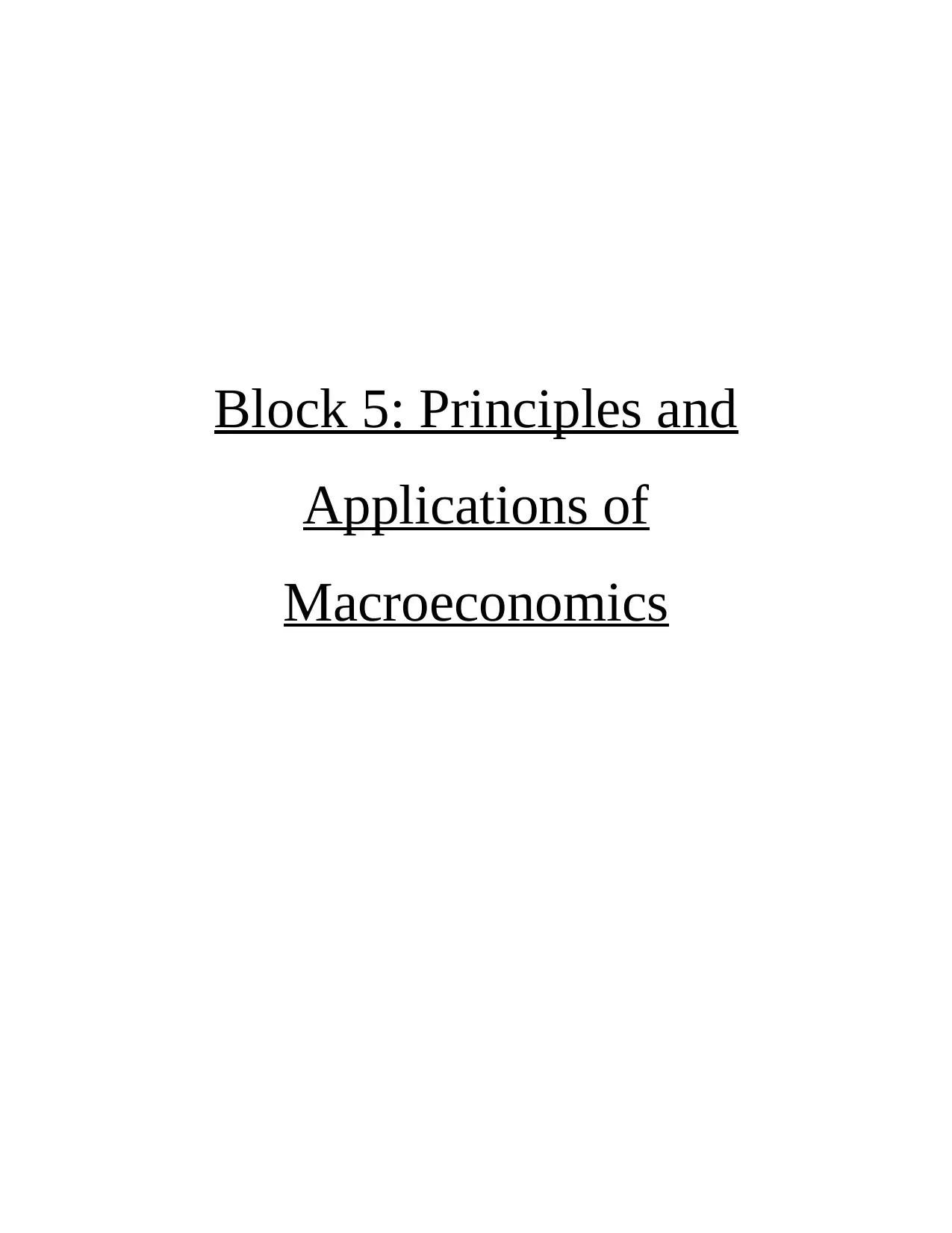
Block 5: Principles and
Applications of
Macroeconomics
Applications of
Macroeconomics
Secure Best Marks with AI Grader
Need help grading? Try our AI Grader for instant feedback on your assignments.
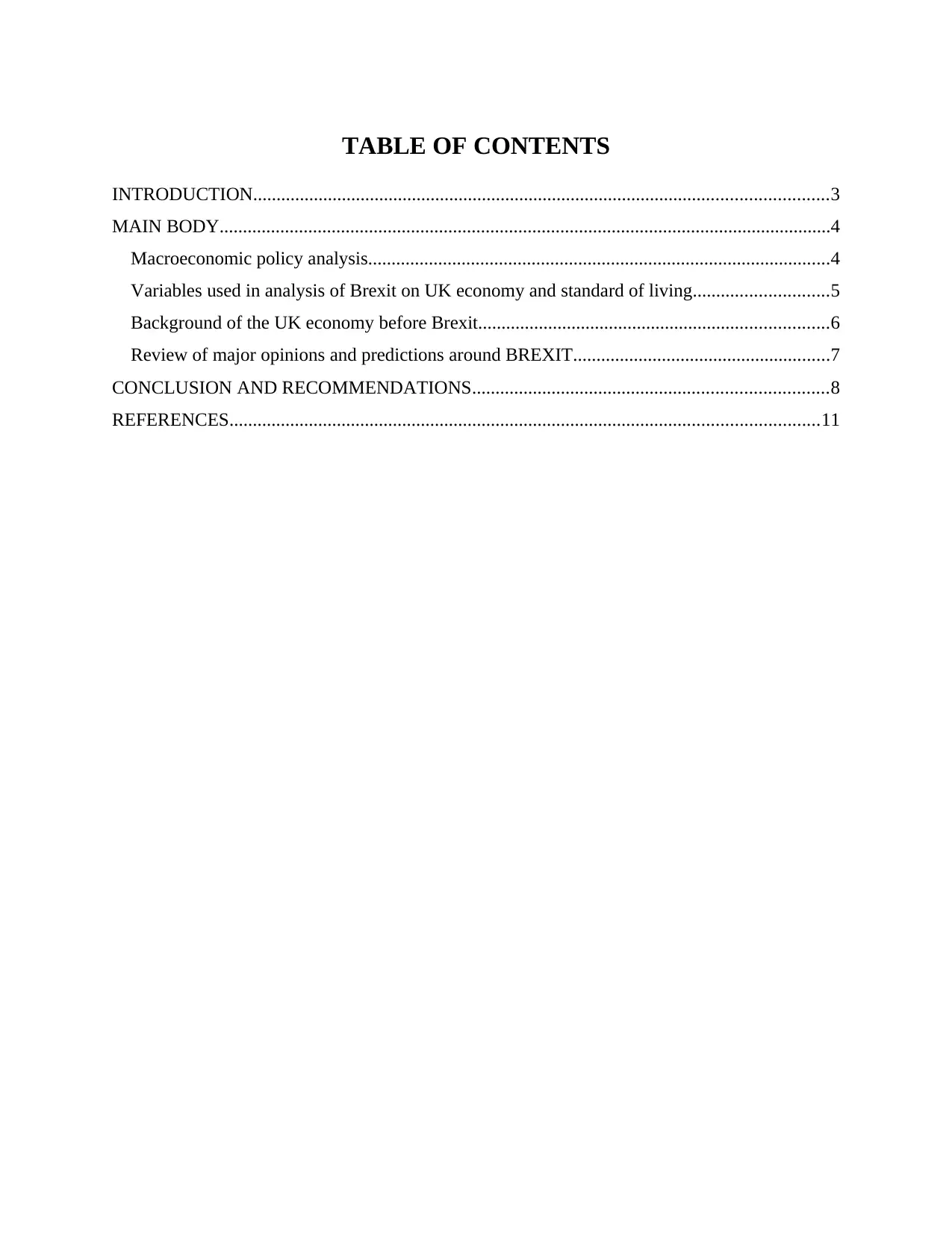
TABLE OF CONTENTS
INTRODUCTION...........................................................................................................................3
MAIN BODY...................................................................................................................................4
Macroeconomic policy analysis...................................................................................................4
Variables used in analysis of Brexit on UK economy and standard of living.............................5
Background of the UK economy before Brexit...........................................................................6
Review of major opinions and predictions around BREXIT.......................................................7
CONCLUSION AND RECOMMENDATIONS............................................................................8
REFERENCES..............................................................................................................................11
INTRODUCTION...........................................................................................................................3
MAIN BODY...................................................................................................................................4
Macroeconomic policy analysis...................................................................................................4
Variables used in analysis of Brexit on UK economy and standard of living.............................5
Background of the UK economy before Brexit...........................................................................6
Review of major opinions and predictions around BREXIT.......................................................7
CONCLUSION AND RECOMMENDATIONS............................................................................8
REFERENCES..............................................................................................................................11
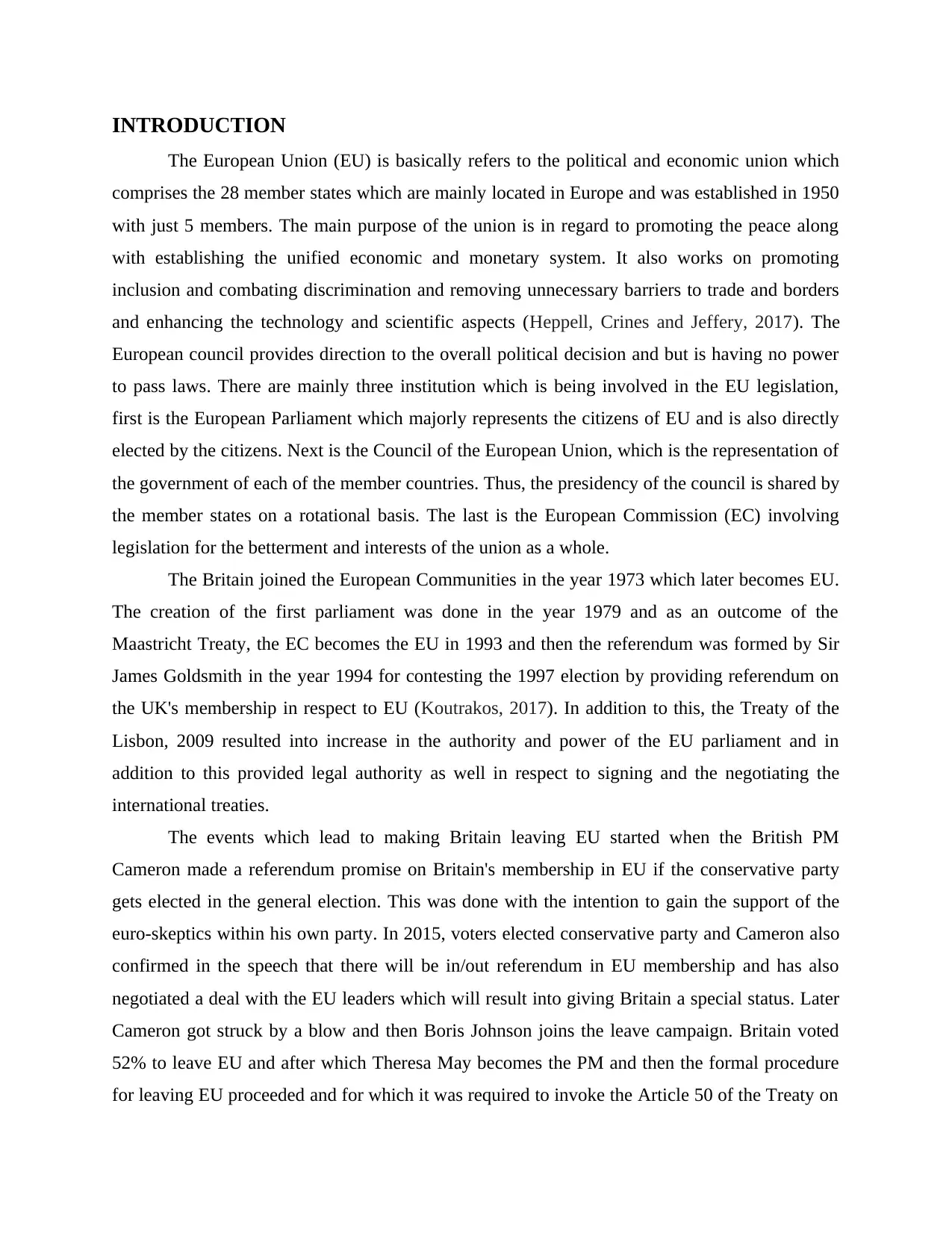
INTRODUCTION
The European Union (EU) is basically refers to the political and economic union which
comprises the 28 member states which are mainly located in Europe and was established in 1950
with just 5 members. The main purpose of the union is in regard to promoting the peace along
with establishing the unified economic and monetary system. It also works on promoting
inclusion and combating discrimination and removing unnecessary barriers to trade and borders
and enhancing the technology and scientific aspects (Heppell, Crines and Jeffery, 2017). The
European council provides direction to the overall political decision and but is having no power
to pass laws. There are mainly three institution which is being involved in the EU legislation,
first is the European Parliament which majorly represents the citizens of EU and is also directly
elected by the citizens. Next is the Council of the European Union, which is the representation of
the government of each of the member countries. Thus, the presidency of the council is shared by
the member states on a rotational basis. The last is the European Commission (EC) involving
legislation for the betterment and interests of the union as a whole.
The Britain joined the European Communities in the year 1973 which later becomes EU.
The creation of the first parliament was done in the year 1979 and as an outcome of the
Maastricht Treaty, the EC becomes the EU in 1993 and then the referendum was formed by Sir
James Goldsmith in the year 1994 for contesting the 1997 election by providing referendum on
the UK's membership in respect to EU (Koutrakos, 2017). In addition to this, the Treaty of the
Lisbon, 2009 resulted into increase in the authority and power of the EU parliament and in
addition to this provided legal authority as well in respect to signing and the negotiating the
international treaties.
The events which lead to making Britain leaving EU started when the British PM
Cameron made a referendum promise on Britain's membership in EU if the conservative party
gets elected in the general election. This was done with the intention to gain the support of the
euro-skeptics within his own party. In 2015, voters elected conservative party and Cameron also
confirmed in the speech that there will be in/out referendum in EU membership and has also
negotiated a deal with the EU leaders which will result into giving Britain a special status. Later
Cameron got struck by a blow and then Boris Johnson joins the leave campaign. Britain voted
52% to leave EU and after which Theresa May becomes the PM and then the formal procedure
for leaving EU proceeded and for which it was required to invoke the Article 50 of the Treaty on
The European Union (EU) is basically refers to the political and economic union which
comprises the 28 member states which are mainly located in Europe and was established in 1950
with just 5 members. The main purpose of the union is in regard to promoting the peace along
with establishing the unified economic and monetary system. It also works on promoting
inclusion and combating discrimination and removing unnecessary barriers to trade and borders
and enhancing the technology and scientific aspects (Heppell, Crines and Jeffery, 2017). The
European council provides direction to the overall political decision and but is having no power
to pass laws. There are mainly three institution which is being involved in the EU legislation,
first is the European Parliament which majorly represents the citizens of EU and is also directly
elected by the citizens. Next is the Council of the European Union, which is the representation of
the government of each of the member countries. Thus, the presidency of the council is shared by
the member states on a rotational basis. The last is the European Commission (EC) involving
legislation for the betterment and interests of the union as a whole.
The Britain joined the European Communities in the year 1973 which later becomes EU.
The creation of the first parliament was done in the year 1979 and as an outcome of the
Maastricht Treaty, the EC becomes the EU in 1993 and then the referendum was formed by Sir
James Goldsmith in the year 1994 for contesting the 1997 election by providing referendum on
the UK's membership in respect to EU (Koutrakos, 2017). In addition to this, the Treaty of the
Lisbon, 2009 resulted into increase in the authority and power of the EU parliament and in
addition to this provided legal authority as well in respect to signing and the negotiating the
international treaties.
The events which lead to making Britain leaving EU started when the British PM
Cameron made a referendum promise on Britain's membership in EU if the conservative party
gets elected in the general election. This was done with the intention to gain the support of the
euro-skeptics within his own party. In 2015, voters elected conservative party and Cameron also
confirmed in the speech that there will be in/out referendum in EU membership and has also
negotiated a deal with the EU leaders which will result into giving Britain a special status. Later
Cameron got struck by a blow and then Boris Johnson joins the leave campaign. Britain voted
52% to leave EU and after which Theresa May becomes the PM and then the formal procedure
for leaving EU proceeded and for which it was required to invoke the Article 50 of the Treaty on
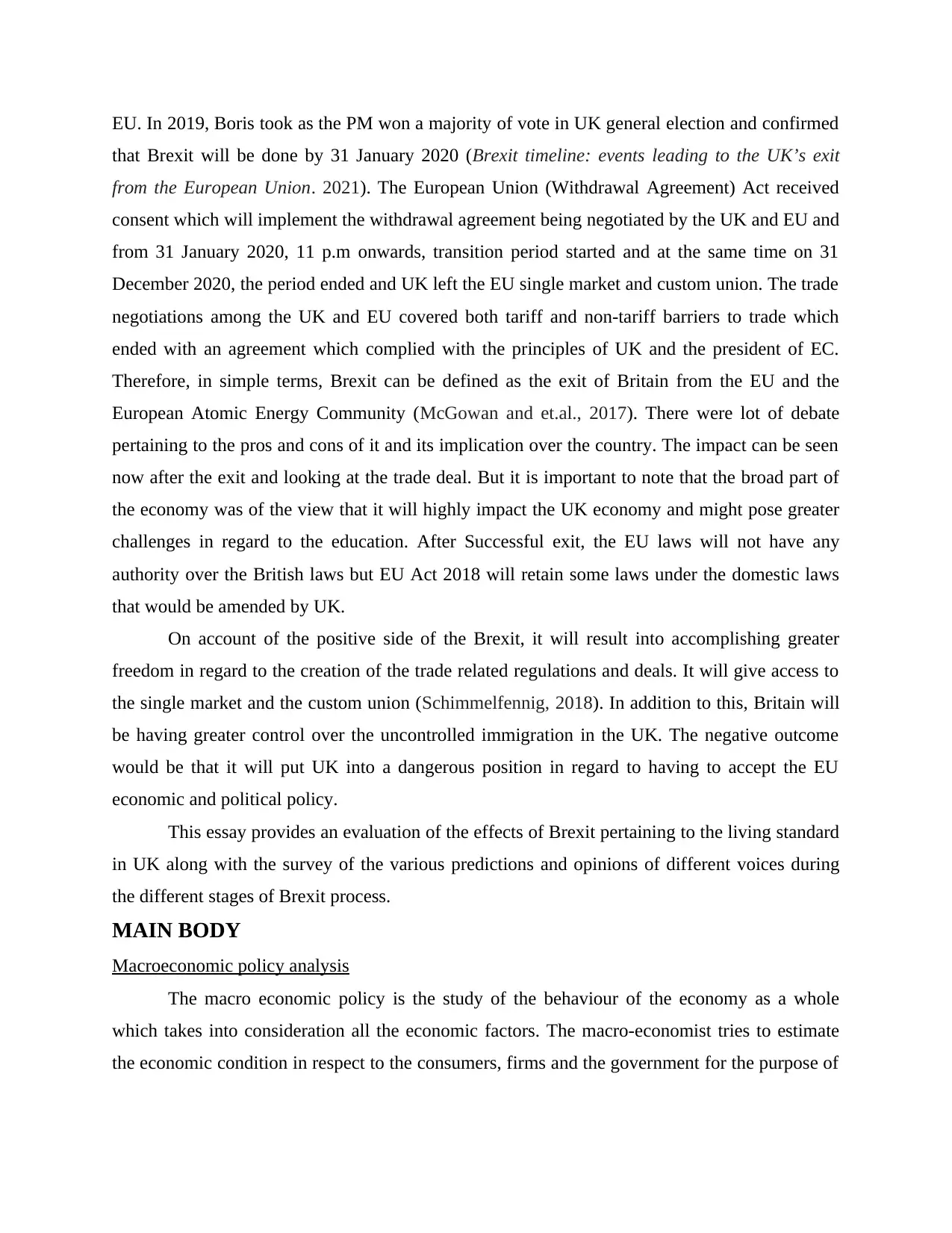
EU. In 2019, Boris took as the PM won a majority of vote in UK general election and confirmed
that Brexit will be done by 31 January 2020 (Brexit timeline: events leading to the UK’s exit
from the European Union. 2021). The European Union (Withdrawal Agreement) Act received
consent which will implement the withdrawal agreement being negotiated by the UK and EU and
from 31 January 2020, 11 p.m onwards, transition period started and at the same time on 31
December 2020, the period ended and UK left the EU single market and custom union. The trade
negotiations among the UK and EU covered both tariff and non-tariff barriers to trade which
ended with an agreement which complied with the principles of UK and the president of EC.
Therefore, in simple terms, Brexit can be defined as the exit of Britain from the EU and the
European Atomic Energy Community (McGowan and et.al., 2017). There were lot of debate
pertaining to the pros and cons of it and its implication over the country. The impact can be seen
now after the exit and looking at the trade deal. But it is important to note that the broad part of
the economy was of the view that it will highly impact the UK economy and might pose greater
challenges in regard to the education. After Successful exit, the EU laws will not have any
authority over the British laws but EU Act 2018 will retain some laws under the domestic laws
that would be amended by UK.
On account of the positive side of the Brexit, it will result into accomplishing greater
freedom in regard to the creation of the trade related regulations and deals. It will give access to
the single market and the custom union (Schimmelfennig, 2018). In addition to this, Britain will
be having greater control over the uncontrolled immigration in the UK. The negative outcome
would be that it will put UK into a dangerous position in regard to having to accept the EU
economic and political policy.
This essay provides an evaluation of the effects of Brexit pertaining to the living standard
in UK along with the survey of the various predictions and opinions of different voices during
the different stages of Brexit process.
MAIN BODY
Macroeconomic policy analysis
The macro economic policy is the study of the behaviour of the economy as a whole
which takes into consideration all the economic factors. The macro-economist tries to estimate
the economic condition in respect to the consumers, firms and the government for the purpose of
that Brexit will be done by 31 January 2020 (Brexit timeline: events leading to the UK’s exit
from the European Union. 2021). The European Union (Withdrawal Agreement) Act received
consent which will implement the withdrawal agreement being negotiated by the UK and EU and
from 31 January 2020, 11 p.m onwards, transition period started and at the same time on 31
December 2020, the period ended and UK left the EU single market and custom union. The trade
negotiations among the UK and EU covered both tariff and non-tariff barriers to trade which
ended with an agreement which complied with the principles of UK and the president of EC.
Therefore, in simple terms, Brexit can be defined as the exit of Britain from the EU and the
European Atomic Energy Community (McGowan and et.al., 2017). There were lot of debate
pertaining to the pros and cons of it and its implication over the country. The impact can be seen
now after the exit and looking at the trade deal. But it is important to note that the broad part of
the economy was of the view that it will highly impact the UK economy and might pose greater
challenges in regard to the education. After Successful exit, the EU laws will not have any
authority over the British laws but EU Act 2018 will retain some laws under the domestic laws
that would be amended by UK.
On account of the positive side of the Brexit, it will result into accomplishing greater
freedom in regard to the creation of the trade related regulations and deals. It will give access to
the single market and the custom union (Schimmelfennig, 2018). In addition to this, Britain will
be having greater control over the uncontrolled immigration in the UK. The negative outcome
would be that it will put UK into a dangerous position in regard to having to accept the EU
economic and political policy.
This essay provides an evaluation of the effects of Brexit pertaining to the living standard
in UK along with the survey of the various predictions and opinions of different voices during
the different stages of Brexit process.
MAIN BODY
Macroeconomic policy analysis
The macro economic policy is the study of the behaviour of the economy as a whole
which takes into consideration all the economic factors. The macro-economist tries to estimate
the economic condition in respect to the consumers, firms and the government for the purpose of
Secure Best Marks with AI Grader
Need help grading? Try our AI Grader for instant feedback on your assignments.
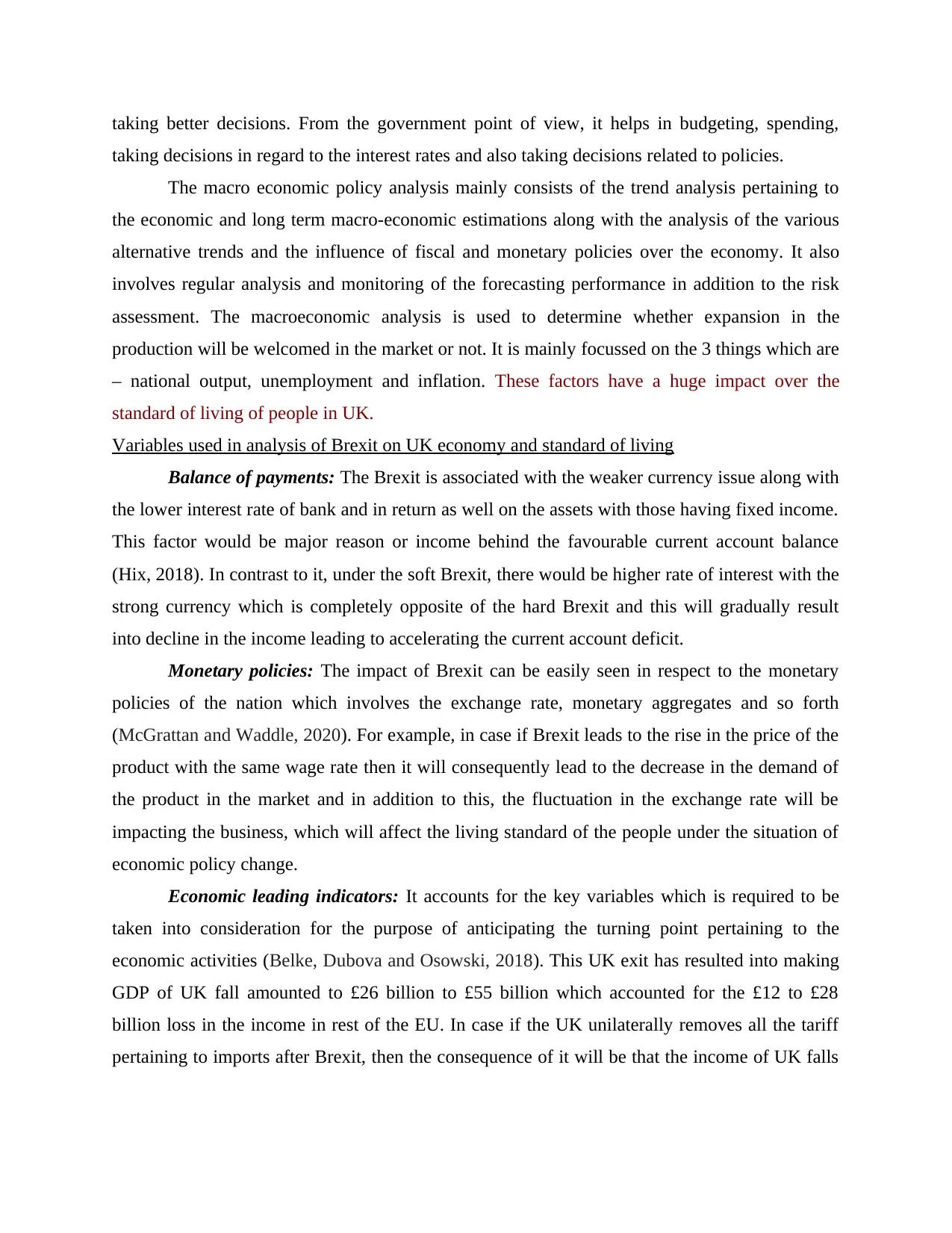
taking better decisions. From the government point of view, it helps in budgeting, spending,
taking decisions in regard to the interest rates and also taking decisions related to policies.
The macro economic policy analysis mainly consists of the trend analysis pertaining to
the economic and long term macro-economic estimations along with the analysis of the various
alternative trends and the influence of fiscal and monetary policies over the economy. It also
involves regular analysis and monitoring of the forecasting performance in addition to the risk
assessment. The macroeconomic analysis is used to determine whether expansion in the
production will be welcomed in the market or not. It is mainly focussed on the 3 things which are
– national output, unemployment and inflation. These factors have a huge impact over the
standard of living of people in UK.
Variables used in analysis of Brexit on UK economy and standard of living
Balance of payments: The Brexit is associated with the weaker currency issue along with
the lower interest rate of bank and in return as well on the assets with those having fixed income.
This factor would be major reason or income behind the favourable current account balance
(Hix, 2018). In contrast to it, under the soft Brexit, there would be higher rate of interest with the
strong currency which is completely opposite of the hard Brexit and this will gradually result
into decline in the income leading to accelerating the current account deficit.
Monetary policies: The impact of Brexit can be easily seen in respect to the monetary
policies of the nation which involves the exchange rate, monetary aggregates and so forth
(McGrattan and Waddle, 2020). For example, in case if Brexit leads to the rise in the price of the
product with the same wage rate then it will consequently lead to the decrease in the demand of
the product in the market and in addition to this, the fluctuation in the exchange rate will be
impacting the business, which will affect the living standard of the people under the situation of
economic policy change.
Economic leading indicators: It accounts for the key variables which is required to be
taken into consideration for the purpose of anticipating the turning point pertaining to the
economic activities (Belke, Dubova and Osowski, 2018). This UK exit has resulted into making
GDP of UK fall amounted to £26 billion to £55 billion which accounted for the £12 to £28
billion loss in the income in rest of the EU. In case if the UK unilaterally removes all the tariff
pertaining to imports after Brexit, then the consequence of it will be that the income of UK falls
taking decisions in regard to the interest rates and also taking decisions related to policies.
The macro economic policy analysis mainly consists of the trend analysis pertaining to
the economic and long term macro-economic estimations along with the analysis of the various
alternative trends and the influence of fiscal and monetary policies over the economy. It also
involves regular analysis and monitoring of the forecasting performance in addition to the risk
assessment. The macroeconomic analysis is used to determine whether expansion in the
production will be welcomed in the market or not. It is mainly focussed on the 3 things which are
– national output, unemployment and inflation. These factors have a huge impact over the
standard of living of people in UK.
Variables used in analysis of Brexit on UK economy and standard of living
Balance of payments: The Brexit is associated with the weaker currency issue along with
the lower interest rate of bank and in return as well on the assets with those having fixed income.
This factor would be major reason or income behind the favourable current account balance
(Hix, 2018). In contrast to it, under the soft Brexit, there would be higher rate of interest with the
strong currency which is completely opposite of the hard Brexit and this will gradually result
into decline in the income leading to accelerating the current account deficit.
Monetary policies: The impact of Brexit can be easily seen in respect to the monetary
policies of the nation which involves the exchange rate, monetary aggregates and so forth
(McGrattan and Waddle, 2020). For example, in case if Brexit leads to the rise in the price of the
product with the same wage rate then it will consequently lead to the decrease in the demand of
the product in the market and in addition to this, the fluctuation in the exchange rate will be
impacting the business, which will affect the living standard of the people under the situation of
economic policy change.
Economic leading indicators: It accounts for the key variables which is required to be
taken into consideration for the purpose of anticipating the turning point pertaining to the
economic activities (Belke, Dubova and Osowski, 2018). This UK exit has resulted into making
GDP of UK fall amounted to £26 billion to £55 billion which accounted for the £12 to £28
billion loss in the income in rest of the EU. In case if the UK unilaterally removes all the tariff
pertaining to imports after Brexit, then the consequence of it will be that the income of UK falls
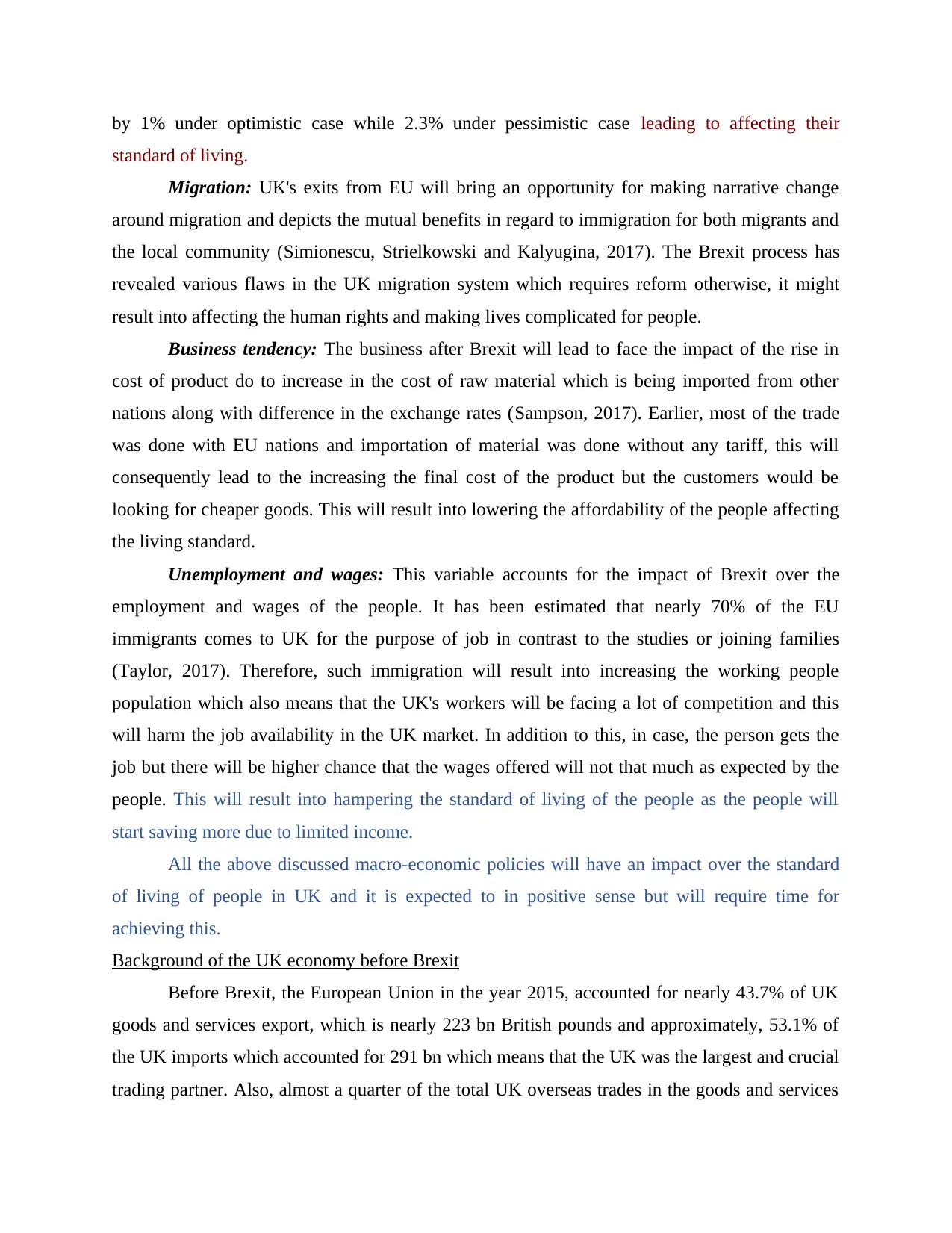
by 1% under optimistic case while 2.3% under pessimistic case leading to affecting their
standard of living.
Migration: UK's exits from EU will bring an opportunity for making narrative change
around migration and depicts the mutual benefits in regard to immigration for both migrants and
the local community (Simionescu, Strielkowski and Kalyugina, 2017). The Brexit process has
revealed various flaws in the UK migration system which requires reform otherwise, it might
result into affecting the human rights and making lives complicated for people.
Business tendency: The business after Brexit will lead to face the impact of the rise in
cost of product do to increase in the cost of raw material which is being imported from other
nations along with difference in the exchange rates (Sampson, 2017). Earlier, most of the trade
was done with EU nations and importation of material was done without any tariff, this will
consequently lead to the increasing the final cost of the product but the customers would be
looking for cheaper goods. This will result into lowering the affordability of the people affecting
the living standard.
Unemployment and wages: This variable accounts for the impact of Brexit over the
employment and wages of the people. It has been estimated that nearly 70% of the EU
immigrants comes to UK for the purpose of job in contrast to the studies or joining families
(Taylor, 2017). Therefore, such immigration will result into increasing the working people
population which also means that the UK's workers will be facing a lot of competition and this
will harm the job availability in the UK market. In addition to this, in case, the person gets the
job but there will be higher chance that the wages offered will not that much as expected by the
people. This will result into hampering the standard of living of the people as the people will
start saving more due to limited income.
All the above discussed macro-economic policies will have an impact over the standard
of living of people in UK and it is expected to in positive sense but will require time for
achieving this.
Background of the UK economy before Brexit
Before Brexit, the European Union in the year 2015, accounted for nearly 43.7% of UK
goods and services export, which is nearly 223 bn British pounds and approximately, 53.1% of
the UK imports which accounted for 291 bn which means that the UK was the largest and crucial
trading partner. Also, almost a quarter of the total UK overseas trades in the goods and services
standard of living.
Migration: UK's exits from EU will bring an opportunity for making narrative change
around migration and depicts the mutual benefits in regard to immigration for both migrants and
the local community (Simionescu, Strielkowski and Kalyugina, 2017). The Brexit process has
revealed various flaws in the UK migration system which requires reform otherwise, it might
result into affecting the human rights and making lives complicated for people.
Business tendency: The business after Brexit will lead to face the impact of the rise in
cost of product do to increase in the cost of raw material which is being imported from other
nations along with difference in the exchange rates (Sampson, 2017). Earlier, most of the trade
was done with EU nations and importation of material was done without any tariff, this will
consequently lead to the increasing the final cost of the product but the customers would be
looking for cheaper goods. This will result into lowering the affordability of the people affecting
the living standard.
Unemployment and wages: This variable accounts for the impact of Brexit over the
employment and wages of the people. It has been estimated that nearly 70% of the EU
immigrants comes to UK for the purpose of job in contrast to the studies or joining families
(Taylor, 2017). Therefore, such immigration will result into increasing the working people
population which also means that the UK's workers will be facing a lot of competition and this
will harm the job availability in the UK market. In addition to this, in case, the person gets the
job but there will be higher chance that the wages offered will not that much as expected by the
people. This will result into hampering the standard of living of the people as the people will
start saving more due to limited income.
All the above discussed macro-economic policies will have an impact over the standard
of living of people in UK and it is expected to in positive sense but will require time for
achieving this.
Background of the UK economy before Brexit
Before Brexit, the European Union in the year 2015, accounted for nearly 43.7% of UK
goods and services export, which is nearly 223 bn British pounds and approximately, 53.1% of
the UK imports which accounted for 291 bn which means that the UK was the largest and crucial
trading partner. Also, almost a quarter of the total UK overseas trades in the goods and services
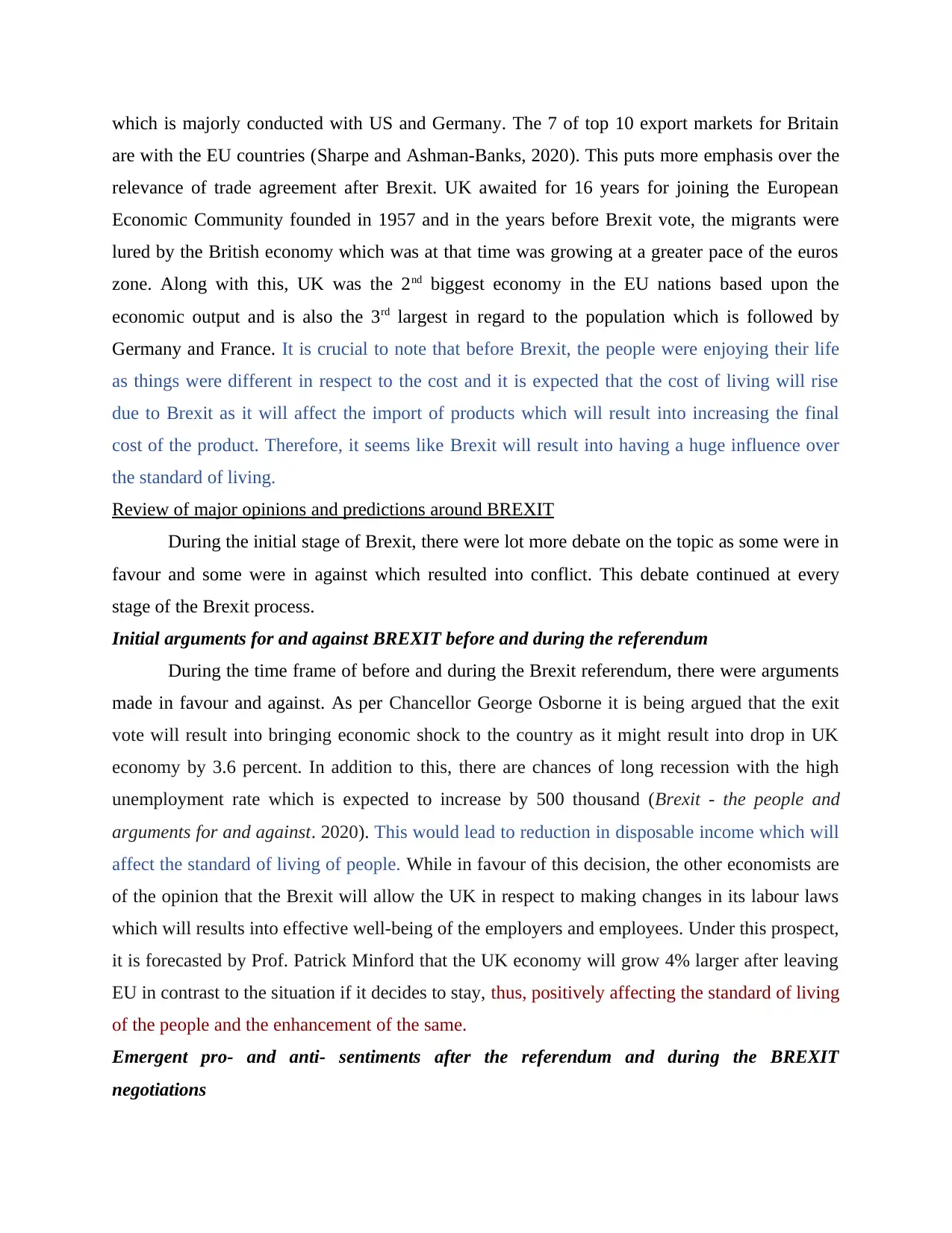
which is majorly conducted with US and Germany. The 7 of top 10 export markets for Britain
are with the EU countries (Sharpe and Ashman-Banks, 2020). This puts more emphasis over the
relevance of trade agreement after Brexit. UK awaited for 16 years for joining the European
Economic Community founded in 1957 and in the years before Brexit vote, the migrants were
lured by the British economy which was at that time was growing at a greater pace of the euros
zone. Along with this, UK was the 2nd biggest economy in the EU nations based upon the
economic output and is also the 3rd largest in regard to the population which is followed by
Germany and France. It is crucial to note that before Brexit, the people were enjoying their life
as things were different in respect to the cost and it is expected that the cost of living will rise
due to Brexit as it will affect the import of products which will result into increasing the final
cost of the product. Therefore, it seems like Brexit will result into having a huge influence over
the standard of living.
Review of major opinions and predictions around BREXIT
During the initial stage of Brexit, there were lot more debate on the topic as some were in
favour and some were in against which resulted into conflict. This debate continued at every
stage of the Brexit process.
Initial arguments for and against BREXIT before and during the referendum
During the time frame of before and during the Brexit referendum, there were arguments
made in favour and against. As per Chancellor George Osborne it is being argued that the exit
vote will result into bringing economic shock to the country as it might result into drop in UK
economy by 3.6 percent. In addition to this, there are chances of long recession with the high
unemployment rate which is expected to increase by 500 thousand (Brexit - the people and
arguments for and against. 2020). This would lead to reduction in disposable income which will
affect the standard of living of people. While in favour of this decision, the other economists are
of the opinion that the Brexit will allow the UK in respect to making changes in its labour laws
which will results into effective well-being of the employers and employees. Under this prospect,
it is forecasted by Prof. Patrick Minford that the UK economy will grow 4% larger after leaving
EU in contrast to the situation if it decides to stay, thus, positively affecting the standard of living
of the people and the enhancement of the same.
Emergent pro- and anti- sentiments after the referendum and during the BREXIT
negotiations
are with the EU countries (Sharpe and Ashman-Banks, 2020). This puts more emphasis over the
relevance of trade agreement after Brexit. UK awaited for 16 years for joining the European
Economic Community founded in 1957 and in the years before Brexit vote, the migrants were
lured by the British economy which was at that time was growing at a greater pace of the euros
zone. Along with this, UK was the 2nd biggest economy in the EU nations based upon the
economic output and is also the 3rd largest in regard to the population which is followed by
Germany and France. It is crucial to note that before Brexit, the people were enjoying their life
as things were different in respect to the cost and it is expected that the cost of living will rise
due to Brexit as it will affect the import of products which will result into increasing the final
cost of the product. Therefore, it seems like Brexit will result into having a huge influence over
the standard of living.
Review of major opinions and predictions around BREXIT
During the initial stage of Brexit, there were lot more debate on the topic as some were in
favour and some were in against which resulted into conflict. This debate continued at every
stage of the Brexit process.
Initial arguments for and against BREXIT before and during the referendum
During the time frame of before and during the Brexit referendum, there were arguments
made in favour and against. As per Chancellor George Osborne it is being argued that the exit
vote will result into bringing economic shock to the country as it might result into drop in UK
economy by 3.6 percent. In addition to this, there are chances of long recession with the high
unemployment rate which is expected to increase by 500 thousand (Brexit - the people and
arguments for and against. 2020). This would lead to reduction in disposable income which will
affect the standard of living of people. While in favour of this decision, the other economists are
of the opinion that the Brexit will allow the UK in respect to making changes in its labour laws
which will results into effective well-being of the employers and employees. Under this prospect,
it is forecasted by Prof. Patrick Minford that the UK economy will grow 4% larger after leaving
EU in contrast to the situation if it decides to stay, thus, positively affecting the standard of living
of the people and the enhancement of the same.
Emergent pro- and anti- sentiments after the referendum and during the BREXIT
negotiations
Paraphrase This Document
Need a fresh take? Get an instant paraphrase of this document with our AI Paraphraser
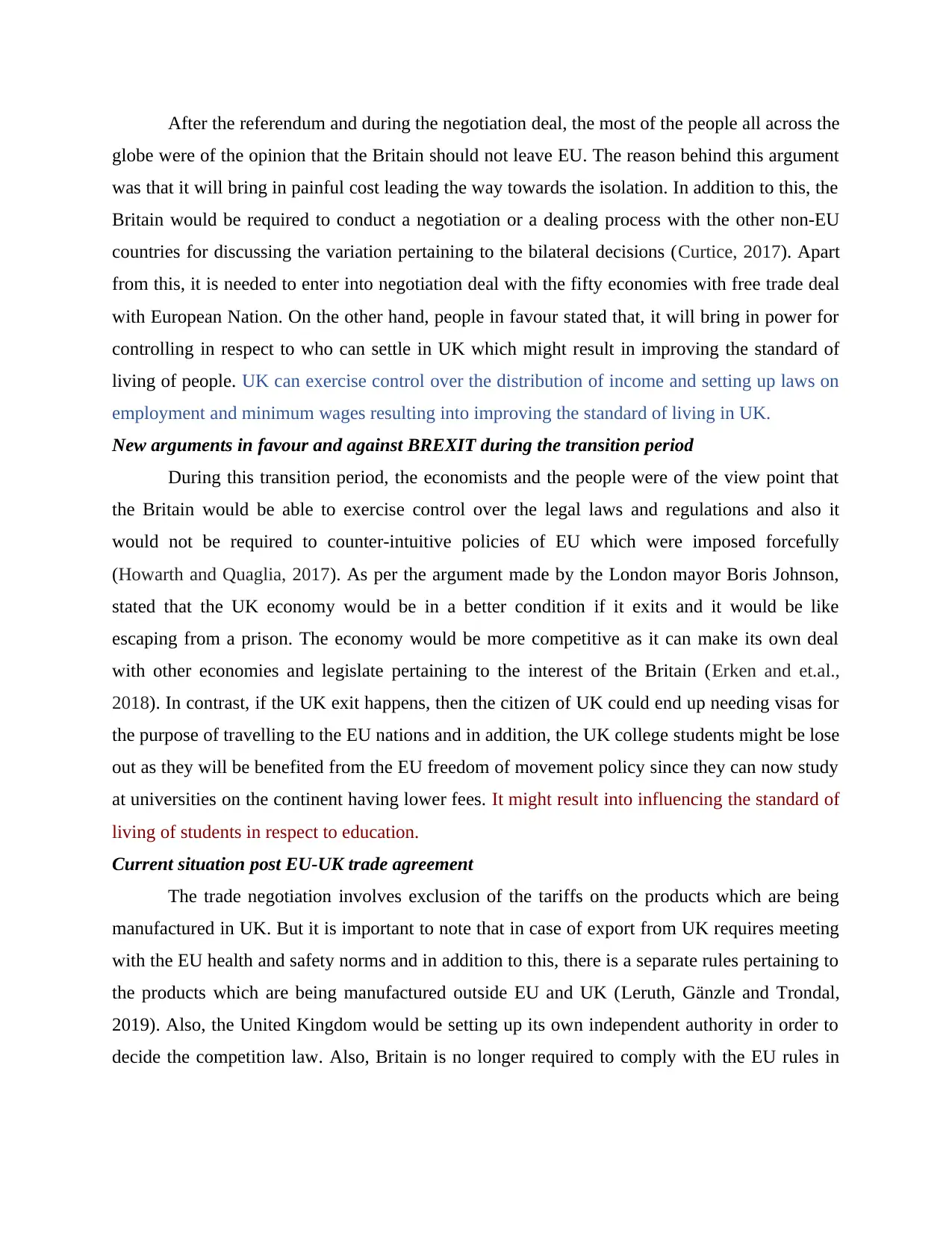
After the referendum and during the negotiation deal, the most of the people all across the
globe were of the opinion that the Britain should not leave EU. The reason behind this argument
was that it will bring in painful cost leading the way towards the isolation. In addition to this, the
Britain would be required to conduct a negotiation or a dealing process with the other non-EU
countries for discussing the variation pertaining to the bilateral decisions (Curtice, 2017). Apart
from this, it is needed to enter into negotiation deal with the fifty economies with free trade deal
with European Nation. On the other hand, people in favour stated that, it will bring in power for
controlling in respect to who can settle in UK which might result in improving the standard of
living of people. UK can exercise control over the distribution of income and setting up laws on
employment and minimum wages resulting into improving the standard of living in UK.
New arguments in favour and against BREXIT during the transition period
During this transition period, the economists and the people were of the view point that
the Britain would be able to exercise control over the legal laws and regulations and also it
would not be required to counter-intuitive policies of EU which were imposed forcefully
(Howarth and Quaglia, 2017). As per the argument made by the London mayor Boris Johnson,
stated that the UK economy would be in a better condition if it exits and it would be like
escaping from a prison. The economy would be more competitive as it can make its own deal
with other economies and legislate pertaining to the interest of the Britain (Erken and et.al.,
2018). In contrast, if the UK exit happens, then the citizen of UK could end up needing visas for
the purpose of travelling to the EU nations and in addition, the UK college students might be lose
out as they will be benefited from the EU freedom of movement policy since they can now study
at universities on the continent having lower fees. It might result into influencing the standard of
living of students in respect to education.
Current situation post EU-UK trade agreement
The trade negotiation involves exclusion of the tariffs on the products which are being
manufactured in UK. But it is important to note that in case of export from UK requires meeting
with the EU health and safety norms and in addition to this, there is a separate rules pertaining to
the products which are being manufactured outside EU and UK (Leruth, Gänzle and Trondal,
2019). Also, the United Kingdom would be setting up its own independent authority in order to
decide the competition law. Also, Britain is no longer required to comply with the EU rules in
globe were of the opinion that the Britain should not leave EU. The reason behind this argument
was that it will bring in painful cost leading the way towards the isolation. In addition to this, the
Britain would be required to conduct a negotiation or a dealing process with the other non-EU
countries for discussing the variation pertaining to the bilateral decisions (Curtice, 2017). Apart
from this, it is needed to enter into negotiation deal with the fifty economies with free trade deal
with European Nation. On the other hand, people in favour stated that, it will bring in power for
controlling in respect to who can settle in UK which might result in improving the standard of
living of people. UK can exercise control over the distribution of income and setting up laws on
employment and minimum wages resulting into improving the standard of living in UK.
New arguments in favour and against BREXIT during the transition period
During this transition period, the economists and the people were of the view point that
the Britain would be able to exercise control over the legal laws and regulations and also it
would not be required to counter-intuitive policies of EU which were imposed forcefully
(Howarth and Quaglia, 2017). As per the argument made by the London mayor Boris Johnson,
stated that the UK economy would be in a better condition if it exits and it would be like
escaping from a prison. The economy would be more competitive as it can make its own deal
with other economies and legislate pertaining to the interest of the Britain (Erken and et.al.,
2018). In contrast, if the UK exit happens, then the citizen of UK could end up needing visas for
the purpose of travelling to the EU nations and in addition, the UK college students might be lose
out as they will be benefited from the EU freedom of movement policy since they can now study
at universities on the continent having lower fees. It might result into influencing the standard of
living of students in respect to education.
Current situation post EU-UK trade agreement
The trade negotiation involves exclusion of the tariffs on the products which are being
manufactured in UK. But it is important to note that in case of export from UK requires meeting
with the EU health and safety norms and in addition to this, there is a separate rules pertaining to
the products which are being manufactured outside EU and UK (Leruth, Gänzle and Trondal,
2019). Also, the United Kingdom would be setting up its own independent authority in order to
decide the competition law. Also, Britain is no longer required to comply with the EU rules in
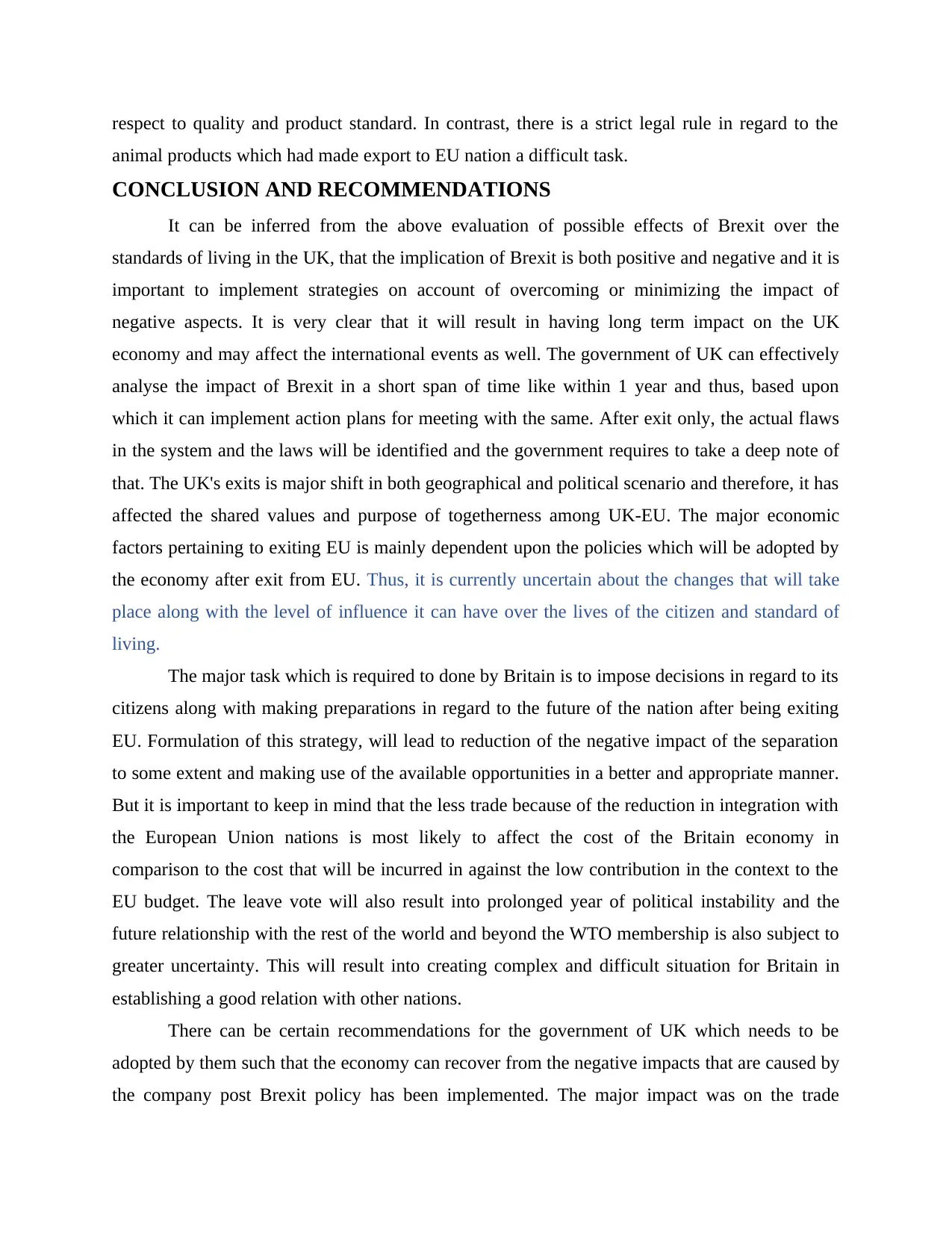
respect to quality and product standard. In contrast, there is a strict legal rule in regard to the
animal products which had made export to EU nation a difficult task.
CONCLUSION AND RECOMMENDATIONS
It can be inferred from the above evaluation of possible effects of Brexit over the
standards of living in the UK, that the implication of Brexit is both positive and negative and it is
important to implement strategies on account of overcoming or minimizing the impact of
negative aspects. It is very clear that it will result in having long term impact on the UK
economy and may affect the international events as well. The government of UK can effectively
analyse the impact of Brexit in a short span of time like within 1 year and thus, based upon
which it can implement action plans for meeting with the same. After exit only, the actual flaws
in the system and the laws will be identified and the government requires to take a deep note of
that. The UK's exits is major shift in both geographical and political scenario and therefore, it has
affected the shared values and purpose of togetherness among UK-EU. The major economic
factors pertaining to exiting EU is mainly dependent upon the policies which will be adopted by
the economy after exit from EU. Thus, it is currently uncertain about the changes that will take
place along with the level of influence it can have over the lives of the citizen and standard of
living.
The major task which is required to done by Britain is to impose decisions in regard to its
citizens along with making preparations in regard to the future of the nation after being exiting
EU. Formulation of this strategy, will lead to reduction of the negative impact of the separation
to some extent and making use of the available opportunities in a better and appropriate manner.
But it is important to keep in mind that the less trade because of the reduction in integration with
the European Union nations is most likely to affect the cost of the Britain economy in
comparison to the cost that will be incurred in against the low contribution in the context to the
EU budget. The leave vote will also result into prolonged year of political instability and the
future relationship with the rest of the world and beyond the WTO membership is also subject to
greater uncertainty. This will result into creating complex and difficult situation for Britain in
establishing a good relation with other nations.
There can be certain recommendations for the government of UK which needs to be
adopted by them such that the economy can recover from the negative impacts that are caused by
the company post Brexit policy has been implemented. The major impact was on the trade
animal products which had made export to EU nation a difficult task.
CONCLUSION AND RECOMMENDATIONS
It can be inferred from the above evaluation of possible effects of Brexit over the
standards of living in the UK, that the implication of Brexit is both positive and negative and it is
important to implement strategies on account of overcoming or minimizing the impact of
negative aspects. It is very clear that it will result in having long term impact on the UK
economy and may affect the international events as well. The government of UK can effectively
analyse the impact of Brexit in a short span of time like within 1 year and thus, based upon
which it can implement action plans for meeting with the same. After exit only, the actual flaws
in the system and the laws will be identified and the government requires to take a deep note of
that. The UK's exits is major shift in both geographical and political scenario and therefore, it has
affected the shared values and purpose of togetherness among UK-EU. The major economic
factors pertaining to exiting EU is mainly dependent upon the policies which will be adopted by
the economy after exit from EU. Thus, it is currently uncertain about the changes that will take
place along with the level of influence it can have over the lives of the citizen and standard of
living.
The major task which is required to done by Britain is to impose decisions in regard to its
citizens along with making preparations in regard to the future of the nation after being exiting
EU. Formulation of this strategy, will lead to reduction of the negative impact of the separation
to some extent and making use of the available opportunities in a better and appropriate manner.
But it is important to keep in mind that the less trade because of the reduction in integration with
the European Union nations is most likely to affect the cost of the Britain economy in
comparison to the cost that will be incurred in against the low contribution in the context to the
EU budget. The leave vote will also result into prolonged year of political instability and the
future relationship with the rest of the world and beyond the WTO membership is also subject to
greater uncertainty. This will result into creating complex and difficult situation for Britain in
establishing a good relation with other nations.
There can be certain recommendations for the government of UK which needs to be
adopted by them such that the economy can recover from the negative impacts that are caused by
the company post Brexit policy has been implemented. The major impact was on the trade
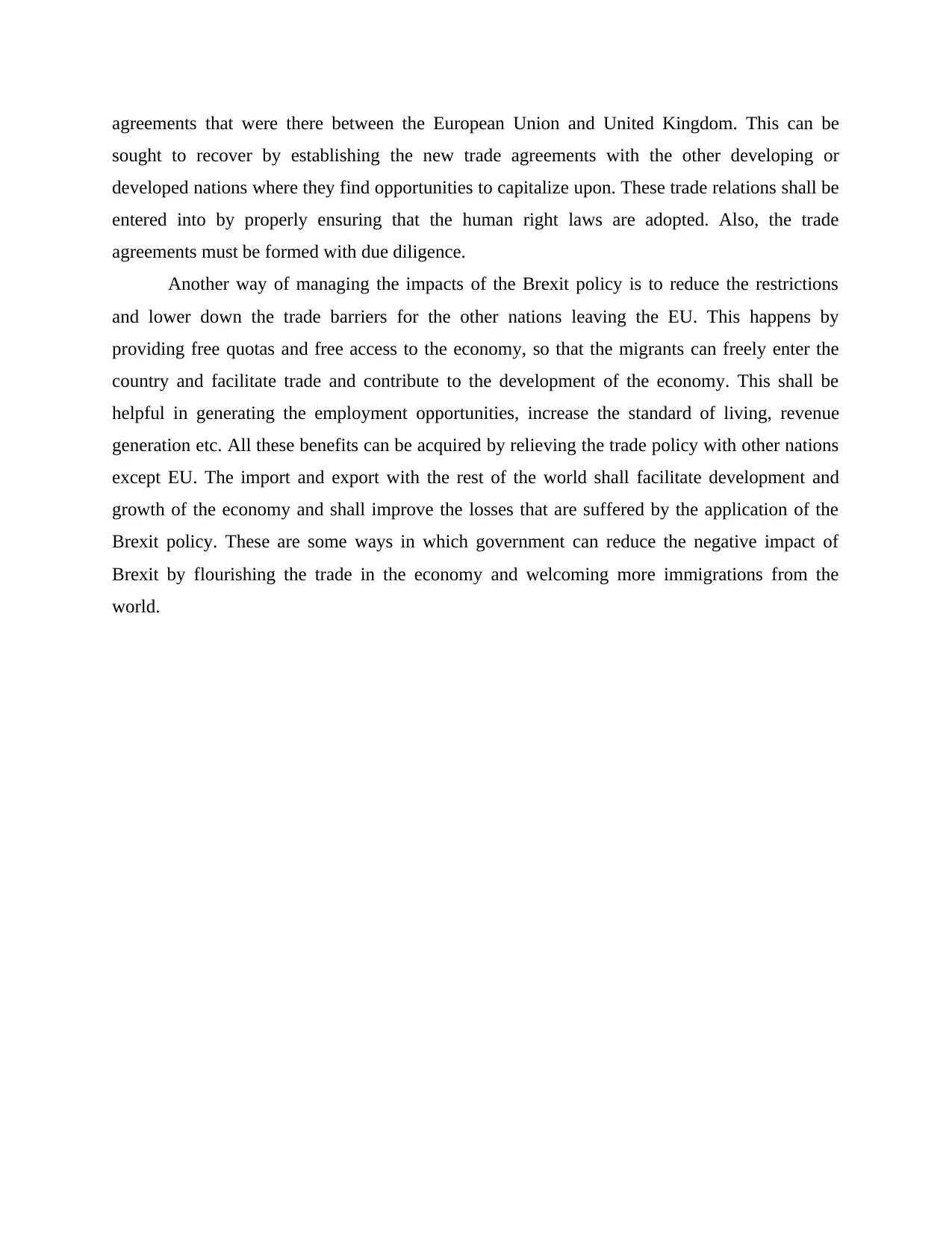
agreements that were there between the European Union and United Kingdom. This can be
sought to recover by establishing the new trade agreements with the other developing or
developed nations where they find opportunities to capitalize upon. These trade relations shall be
entered into by properly ensuring that the human right laws are adopted. Also, the trade
agreements must be formed with due diligence.
Another way of managing the impacts of the Brexit policy is to reduce the restrictions
and lower down the trade barriers for the other nations leaving the EU. This happens by
providing free quotas and free access to the economy, so that the migrants can freely enter the
country and facilitate trade and contribute to the development of the economy. This shall be
helpful in generating the employment opportunities, increase the standard of living, revenue
generation etc. All these benefits can be acquired by relieving the trade policy with other nations
except EU. The import and export with the rest of the world shall facilitate development and
growth of the economy and shall improve the losses that are suffered by the application of the
Brexit policy. These are some ways in which government can reduce the negative impact of
Brexit by flourishing the trade in the economy and welcoming more immigrations from the
world.
sought to recover by establishing the new trade agreements with the other developing or
developed nations where they find opportunities to capitalize upon. These trade relations shall be
entered into by properly ensuring that the human right laws are adopted. Also, the trade
agreements must be formed with due diligence.
Another way of managing the impacts of the Brexit policy is to reduce the restrictions
and lower down the trade barriers for the other nations leaving the EU. This happens by
providing free quotas and free access to the economy, so that the migrants can freely enter the
country and facilitate trade and contribute to the development of the economy. This shall be
helpful in generating the employment opportunities, increase the standard of living, revenue
generation etc. All these benefits can be acquired by relieving the trade policy with other nations
except EU. The import and export with the rest of the world shall facilitate development and
growth of the economy and shall improve the losses that are suffered by the application of the
Brexit policy. These are some ways in which government can reduce the negative impact of
Brexit by flourishing the trade in the economy and welcoming more immigrations from the
world.
Secure Best Marks with AI Grader
Need help grading? Try our AI Grader for instant feedback on your assignments.
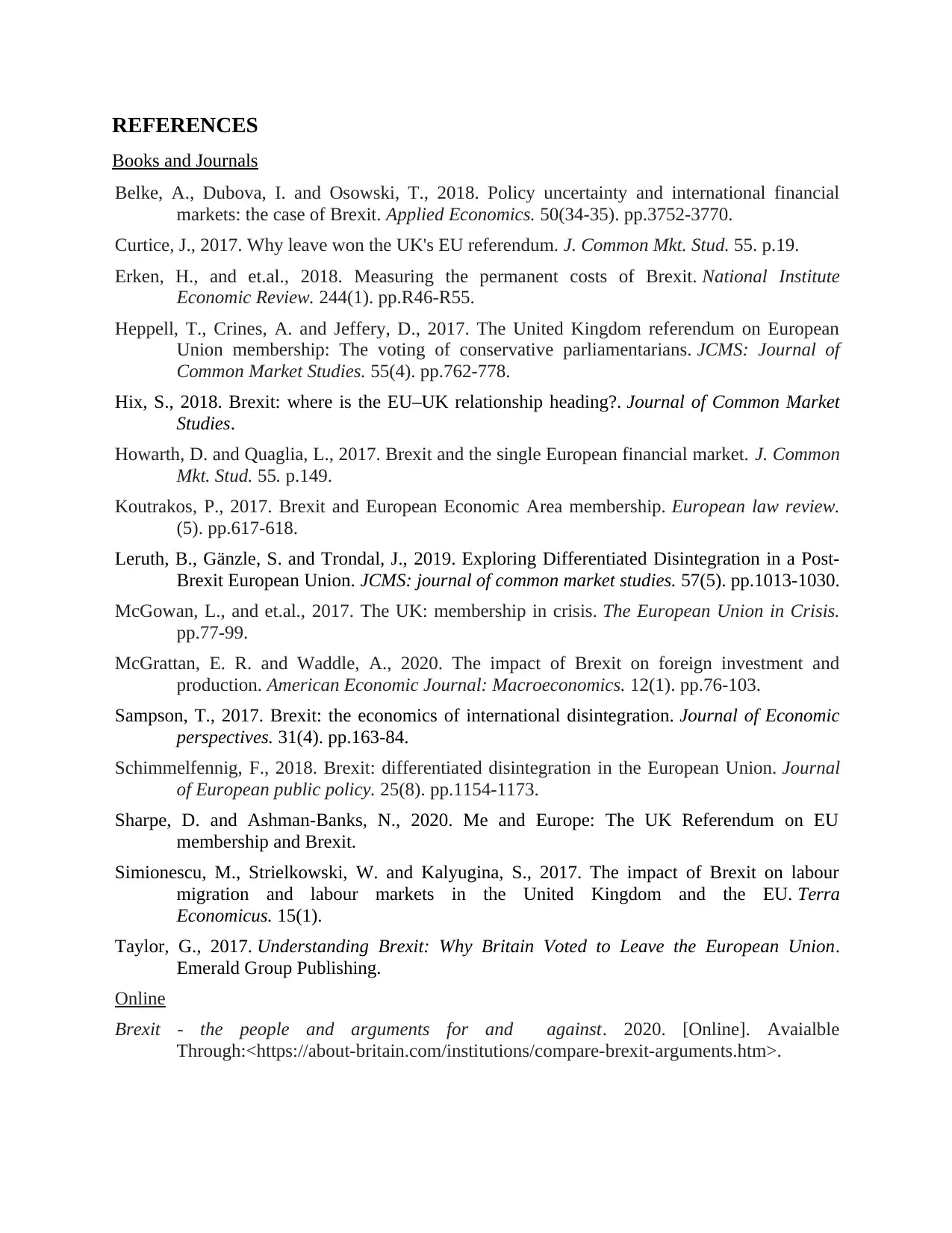
REFERENCES
Books and Journals
Belke, A., Dubova, I. and Osowski, T., 2018. Policy uncertainty and international financial
markets: the case of Brexit. Applied Economics. 50(34-35). pp.3752-3770.
Curtice, J., 2017. Why leave won the UK's EU referendum. J. Common Mkt. Stud. 55. p.19.
Erken, H., and et.al., 2018. Measuring the permanent costs of Brexit. National Institute
Economic Review. 244(1). pp.R46-R55.
Heppell, T., Crines, A. and Jeffery, D., 2017. The United Kingdom referendum on European
Union membership: The voting of conservative parliamentarians. JCMS: Journal of
Common Market Studies. 55(4). pp.762-778.
Hix, S., 2018. Brexit: where is the EU–UK relationship heading?. Journal of Common Market
Studies.
Howarth, D. and Quaglia, L., 2017. Brexit and the single European financial market. J. Common
Mkt. Stud. 55. p.149.
Koutrakos, P., 2017. Brexit and European Economic Area membership. European law review.
(5). pp.617-618.
Leruth, B., Gänzle, S. and Trondal, J., 2019. Exploring Differentiated Disintegration in a Post‐
Brexit European Union. JCMS: journal of common market studies. 57(5). pp.1013-1030.
McGowan, L., and et.al., 2017. The UK: membership in crisis. The European Union in Crisis.
pp.77-99.
McGrattan, E. R. and Waddle, A., 2020. The impact of Brexit on foreign investment and
production. American Economic Journal: Macroeconomics. 12(1). pp.76-103.
Sampson, T., 2017. Brexit: the economics of international disintegration. Journal of Economic
perspectives. 31(4). pp.163-84.
Schimmelfennig, F., 2018. Brexit: differentiated disintegration in the European Union. Journal
of European public policy. 25(8). pp.1154-1173.
Sharpe, D. and Ashman-Banks, N., 2020. Me and Europe: The UK Referendum on EU
membership and Brexit.
Simionescu, M., Strielkowski, W. and Kalyugina, S., 2017. The impact of Brexit on labour
migration and labour markets in the United Kingdom and the EU. Terra
Economicus. 15(1).
Taylor, G., 2017. Understanding Brexit: Why Britain Voted to Leave the European Union.
Emerald Group Publishing.
Online
Brexit - the people and arguments for and against. 2020. [Online]. Avaialble
Through:<https://about-britain.com/institutions/compare-brexit-arguments.htm>.
Books and Journals
Belke, A., Dubova, I. and Osowski, T., 2018. Policy uncertainty and international financial
markets: the case of Brexit. Applied Economics. 50(34-35). pp.3752-3770.
Curtice, J., 2017. Why leave won the UK's EU referendum. J. Common Mkt. Stud. 55. p.19.
Erken, H., and et.al., 2018. Measuring the permanent costs of Brexit. National Institute
Economic Review. 244(1). pp.R46-R55.
Heppell, T., Crines, A. and Jeffery, D., 2017. The United Kingdom referendum on European
Union membership: The voting of conservative parliamentarians. JCMS: Journal of
Common Market Studies. 55(4). pp.762-778.
Hix, S., 2018. Brexit: where is the EU–UK relationship heading?. Journal of Common Market
Studies.
Howarth, D. and Quaglia, L., 2017. Brexit and the single European financial market. J. Common
Mkt. Stud. 55. p.149.
Koutrakos, P., 2017. Brexit and European Economic Area membership. European law review.
(5). pp.617-618.
Leruth, B., Gänzle, S. and Trondal, J., 2019. Exploring Differentiated Disintegration in a Post‐
Brexit European Union. JCMS: journal of common market studies. 57(5). pp.1013-1030.
McGowan, L., and et.al., 2017. The UK: membership in crisis. The European Union in Crisis.
pp.77-99.
McGrattan, E. R. and Waddle, A., 2020. The impact of Brexit on foreign investment and
production. American Economic Journal: Macroeconomics. 12(1). pp.76-103.
Sampson, T., 2017. Brexit: the economics of international disintegration. Journal of Economic
perspectives. 31(4). pp.163-84.
Schimmelfennig, F., 2018. Brexit: differentiated disintegration in the European Union. Journal
of European public policy. 25(8). pp.1154-1173.
Sharpe, D. and Ashman-Banks, N., 2020. Me and Europe: The UK Referendum on EU
membership and Brexit.
Simionescu, M., Strielkowski, W. and Kalyugina, S., 2017. The impact of Brexit on labour
migration and labour markets in the United Kingdom and the EU. Terra
Economicus. 15(1).
Taylor, G., 2017. Understanding Brexit: Why Britain Voted to Leave the European Union.
Emerald Group Publishing.
Online
Brexit - the people and arguments for and against. 2020. [Online]. Avaialble
Through:<https://about-britain.com/institutions/compare-brexit-arguments.htm>.

Brexit timeline: events leading to the UK’s exit from the European Union. 2021. [Online].
Avaialble Through:<https://commonslibrary.parliament.uk/research-briefings/cbp-
7960/>.
Avaialble Through:<https://commonslibrary.parliament.uk/research-briefings/cbp-
7960/>.
1 out of 12
Related Documents
Your All-in-One AI-Powered Toolkit for Academic Success.
+13062052269
info@desklib.com
Available 24*7 on WhatsApp / Email
![[object Object]](/_next/static/media/star-bottom.7253800d.svg)
Unlock your academic potential
© 2024 | Zucol Services PVT LTD | All rights reserved.





